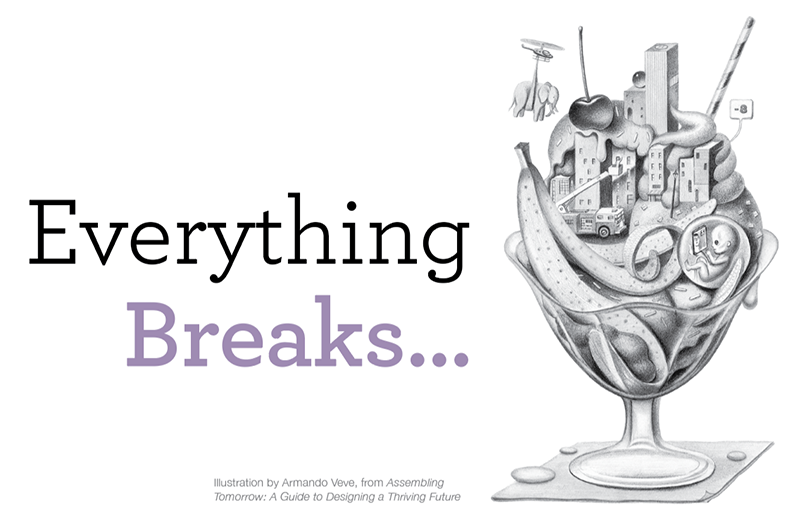Everything Breaks
“Everything breaks–or ends up breaking something else,” says Carissa Carter, stating the basic premise of Assembling Tomorrow. “But by thinking about the world differently—the way designers do—we still have a chance to design for healing and to transform the future.”


“Everything breaks–or ends up breaking something else,” says Carissa Carter, stating the basic premise of Assembling Tomorrow: A Guide to Designing a Thriving Future by Carter and Scott Doorley, June 2024, ISBN 9781984858184 (Ten Speed Press). “But by thinking about the world differently—the way designers do—we still have a chance to design for healing and to transform the future. “
In Assembling Tomorrow, Carter and Doorley, the academic and creative directors respectively of Stanford University’s Hasso Plattner Institute of Design (d.school), explore the tangible and intangible forces that create gaps between how things are designed and how they may tear things apart. This capstone to a 12-title series reflects the d.school’s belief that “everyone has the capacity to be creative and to make positive change.”
Assembling Tomorrow tackles the big question of how to deal with what the authors call “runaway design.”
“Our materials have become more invisible, like algorithms, blockchains, DNA, things that we can’t see and most of us barely understand. When these things break, we sometimes don’t know that they’re broken until too late. We call this runaway design, because these invisible things continue to ‘make’ after we’re done with them and are replicating very, very quickly,” Carter explains.
“In previous eras, humans manipulated technology, now technology is manipulating us. AI makes decisions. Synthetic biology spreads genes. It's a totally different thing, and we mustthink differently to be able to thrive,” Doorley adds.
 The book is divided into two parts: the Intangibles and the Actionables. The Intangibles are the elusive forces causing runaway design. Individual chapters focus on interconnection, i.e., how everything affects everything else; flow, from one place to another like data or decisions; feelings and emotions, which govern our reactions and spark new ideas; and make-believe, which we use to fill the gaps created by our limited points of view. “While we might never be able to control the intangibles, we can learn to recognize, learn from, and work with them,” Carter says.
The book is divided into two parts: the Intangibles and the Actionables. The Intangibles are the elusive forces causing runaway design. Individual chapters focus on interconnection, i.e., how everything affects everything else; flow, from one place to another like data or decisions; feelings and emotions, which govern our reactions and spark new ideas; and make-believe, which we use to fill the gaps created by our limited points of view. “While we might never be able to control the intangibles, we can learn to recognize, learn from, and work with them,” Carter says.
The Actionables are the tactics and techniques for stopping runaway design with big lessons for how we build resilient individuals, produces, businesses, and societies. “How do we proceed with humility and awareness and not stifle our immense creativity and optimism?” Carter asks. The authors advocate for embracing awkwardness and discomfort, shapeshifting and change, disorientation and chaos, and imperfection. Also included are practical applications and exercises to help readers start thinking like designers themselves.
Creatively structured, each chapter toggles between short, digestible nonfiction and speculative fiction pieces, broken up by fantastical illustrations by Armando Veve. “All design begins as a fiction,” Doorley says. “You must fully imagine a design before you can create it. In what context will it exist? How will it work? Who will it affect? Design requires curiosity and an open mind, and that’s hard to do that if you’re too rooted in reality.”
“Speculative fiction allows us to take that leap beyond today's nascent technology to imagine other worlds, in which siblings hack their deceased mother’s AI or technology companies purchase the Brazilian rain forest to keep their customers healthy,” Doorley continues.
Despite the urgency of Carter and Doorley’s message, Assembling Tomorrow is an optimistic book.
“I know this moment feels fraught, but we have been here before,” Carter says. “And every single time, we find a path forward. But it’s not going to happen without care, and that’s what we’re advocating for. We know that we have this in us.”
SPONSORED BY

Add Comment :-
ALREADY A SUBSCRIBER? LOG IN
We are currently offering this content for free. Sign up now to activate your personal profile, where you can save articles for future viewing








